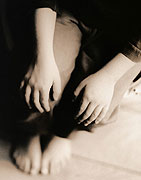
SATURDAY, July 18, 2015 (HealthDay News) — If your child develops an itchy rash, it could be hives, experts say.
Common symptoms of hives — which are usually temporary and harmless — include: slightly raised, pink or red areas on the skin; welts that occur alone, in a group, or that connect over a large area; and skin swelling, according to the American Academy of Dermatology (AAD).
Hives can be triggered by a wide variety of things, including allergic reactions to food or medication, infections, exercise, stress, cold temperatures, insect bites and stings, pollen, sun exposure and scratching the skin.
“The best remedy for hives is to try to avoid whatever triggers them, although identifying this is often difficult,” Dr. Bruce Brod, a clinical professor of dermatology at University of Pennsylvania in Philadelphia, said in an AAD news release.
“One way to help identify your triggers is to keep a log of your child’s symptoms, including the day and time the hives occur and how long they last. You should also pay attention to any changes to your child’s regular environment that may be contributing to the problem, such as dust, animals or the outdoors,” Brod said.
There are a number of things you can do if your child develops hives, Brod said.
An over-the-counter oral antihistamine for children will help relieve the itch and discomfort, and applying a cool washcloth to the affected area might provide additional relief.
Try to prevent your child from scratching the hives, as doing so will worsen the rash. Keep your child’s fingernails short and apply an over-the-counter anti-itch cream with pramoxine or menthol, Brod suggested.
Other treatments include a bath in lukewarm water (no more than 10 minutes), followed by pat drying with a towel and then applying a gentle moisturizing cream or lotion. Your child should wear loose-fitting clothes that are 100-percent cotton.
“If your child’s hives seem to worsen or your child is experiencing more serious symptoms, such as difficulty breathing or vomiting, go to the emergency room immediately, as these symptoms can be more serious or even life-threatening,” Brod said.
More information
The American College of Allergy, Asthma and Immunology has more about hives.
Copyright © 2026 HealthDay. All rights reserved.

